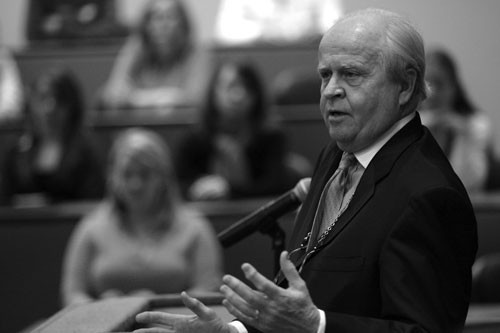
Stadium namesake discusses leadership (Photo by John Schreiber, The Daily Campus)
President Turner’s Leadership Summit met for the first time in 2006 with featured guest Gerald J. Ford. Most students know Ford for his large donation to help build the football stadium that bears his name, but during his talk he focused on his past and how it shaped the person he became.
“There is no formula or plan to follow – there are all different styles of leadership,” Ford said.
He said there is not one characteristic of leadership that makes one person above another. He believes that people should remain true to themselves; otherwise they will be ineffective leaders.
“Whenever I deviated from who I am as a person, I was an embarrassing failure,” Ford said.
Ford said he had several mentors throughout his life that gave him support and guidance to achieve his goals. His fifth and seventh grade teachers and one high school teacher all “affected how I viewed situations and my interactions with people,” he said.
Ford grew up in Pampa, Texas – a small town in the panhandle near the Oklahoma border. Ford mentioned several times how the environment there shaped his thinking later in life.
“I presumed that people in cities were smarter – but it turns out that their thinking wasn’t so different than those in the country,” he said.
When it was time for Ford to go to school, he decided there was only one place for him – SMU. He said it was the only university he applied to.
“SMU had a tremendous impact on my life, and in ways that are not necessarily obvious,” Ford said.
Ford received his undergraduate and law degrees from SMU. He mentioned that during seventh grade he decided to go to law school. During his second year of law school, while spending large amounts of time in the law library, he questioned what he wanted to do with his life.
After graduating he wound up being called into active duty in the military. He credits that time for forming a philosophy that would serve him well in the business world, as well as helping him have a renewed sense of purpose in life.
When he returned from service he began the first of his many business ventures.
Ford admits that for most of his jobs, whether in international trade, the oil business or banking, he was “completely unqualified.” But, Ford said he liked being able to learn on the spot and that experience not only helped him learn more but gain additional perspectives in the business world.
“You tend to learn from your mistakes early on, and with the challenges from the businesses I wound up doing pretty well later,” Ford said.
Specifically, he has five basic beliefs for being successful in the business world:
Be associated with the best people, be transparent, under promise and over deliver, suffer bad news gladly and maintain humility.
More generally, Ford believes that common sense and a willingness to commit will lead to new opportunities in all parts of one’s life.
The final Turner Leadership Summit will be on March 28. A speaker has not been announced yet.








